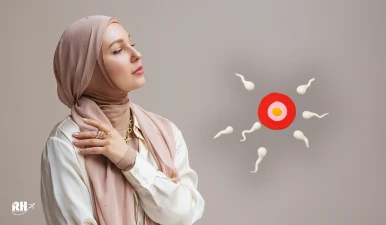Comprehensive Review of Egg Donation in Islam: Religious Rulings and Jurisprudence
Fertility Treatment
Infertility is a common problem globally. Statistics show that about 15 to 20 percent of couples worldwide face this issue. However, advancements in medical science and the use of various methods have greatly helped in treating infertility. Egg donation, sperm donation, IVF, and surrogacy are among the methods used in many countries around the world. Among these, egg donation is one of the challenging methods with many proponents and opponents. This topic has also been debated in many Islamic countries. Is egg donation permissible (halal) or forbidden (haram) in Islam? Join us to fully familiarize yourself with the answers to these questions.
Proponents and Opponents' Views on Egg Donation
Egg donation in Islam has many proponents and opponents, both from the Shia and Sunni schools of thought. Some consider it completely permissible (halal). They believe that if this method causes no harm to the donor, the recipient, or the child, and no unlawful act occurs, it is completely permissible and lawful. This method helps couples who have longed for children for years to experience the sweet dream of parenthood. Furthermore, these individuals emphasize that the resulting child will be the legitimate child of the father and the mother (the recipient woman). The other group opposes this treatment method, believing that it violates human dignity and honor and will cause problems in maintaining the lineage (Nasab) and blood ties between parents and children.
/75_1762945821_large_1762963468_large.webp)
Views of Shia Scholars on Treatment with Donor Eggs
In Shia jurisprudence (Fiqh), pregnancy using donor eggs is generally considered permissible (halal), and most Shia scholars agree with it under specific conditions. For example, Ayatollah Khamenei believes that the donation of eggs, embryos, and even a surrogate uterus is completely lawful and permissible under specific conditions. However, he stated that no unlawful touch, unlawful looking, or illicit sexual relationship should occur during the embryo formation and transfer. From his point of view, an illicit sexual relationship means physical and sexual contact, none of which occurs in this treatment method.
Ayatollah Khamenei, Ayatollah Sistani, and many other Shia Marja's (Sources of Emulation) believe that this method is an example of a good deed and will preserve the foundation of the family, which is one of the important goals of Sharia (Islamic Law). However, some Shia scholars, such as Ayatollah Nouri Hamedani and Ayatollah Vahid Khorasani, have expressed concerns about this method and the possibility of problems arising later. These Marja's do not consider the use of donor eggs forbidden (haram) and believe that egg donation should be performed with more precise care and within specific religious and legal frameworks to prevent subsequent problems.
Views of Sunni Scholars on Egg Donation
In Sunni jurisprudence, the issue of egg donation faces more opposition. Some Sunni scholars, such as Sheikh Ibn Baz and Sheikh Ibn Uthaymeen, consider egg donation unlawful (Ghayr Shar'i) due to the introduction of a third party into reproduction. This group believes that this treatment method will disrupt the lineage of the born infant. They believe that this method may lead to moral, emotional, and social problems for the infant and their parents in the future. In their view, any combination of sperm and the egg of a non-wife, even with the intention of treatment and in a laboratory setting, is forbidden.
On the other hand, some Sunni scholars have permitted this treatment method under specific conditions. For example, Sheikh Muhammad Salih al-Munajjid believes that if the donor woman marries the recipient man, even through temporary marriage (Nikah Mut'ah), the use of her egg for the recipient woman's pregnancy is permissible. Overall, the extent of opposition among Sunni scholars to this treatment method is greater than among Shia scholars.
The Quran's View on Egg Donation
The Quran does not directly refer to the issue of egg donation, but generally, the Sharia can be extrapolated to this issue. The main condition for using this treatment method in all fatwas (religious decrees) is the avoidance of illicit sexual relations, the full consent of the parties, and the preservation of human honor and dignity. If these principles are fully observed, egg donation and pregnancy using this method will be permissible.
Iran: The Hub of Egg Donation in the Islamic World
Iran, as one of the advanced countries in medical science and with a Shia majority, is the only Islamic country that legally performs egg donation and surrogacy under the supervision of religious authorities. Iran has well-equipped treatment clinics with professional staff. Not only have many Iranian couples had children using this method, but many couples from other countries have also traveled to Iran to use this treatment method.
Conclusion
Egg donation is one of the infertility treatment methods in Iran and many countries worldwide. Despite many challenges, this method is completely permissible and legal under specific conditions in Islam, helping infertile couples realize their sweet dream of having children.
Contact us for a free initial consultation about Egg donation
Frequently Asked Questions
Is egg donation permissible (halal) in Islam?
Given the existence of both Shia and Sunni schools of thought, the answer to this question differs. Most Shia scholars consider this treatment method permissible, while many Sunni scholars consider it forbidden. Therefore, you should know the opinion of your Marja' al-Taqlid (Source of Emulation) before using this method.
Is the child resulting from egg donation legitimate?
Yes, because no unlawful act, such as the unlawful looking or touching of a non-mahram (non-related person of the opposite sex), occurs in the fertilization process, the resulting child is legitimate.
What is Iran's position in the treatment method with donor eggs?
Iran is the only Muslim and advanced country in this field that provides donor egg pregnancy services legally, under the supervision of specialized physicians, and with the authorization of religious authorities.
What characteristics should an egg donor have?
The egg donor must be completely screened and approved in terms of general health, egg quality, absence of genetic problems, no criminal record, and no psychological issues.
/94_1763793324_small.webp)

 WhatsApp
WhatsApp
 Telegram
Telegram
 Facebook
Facebook
 Email
Email

No reviews
Your comment